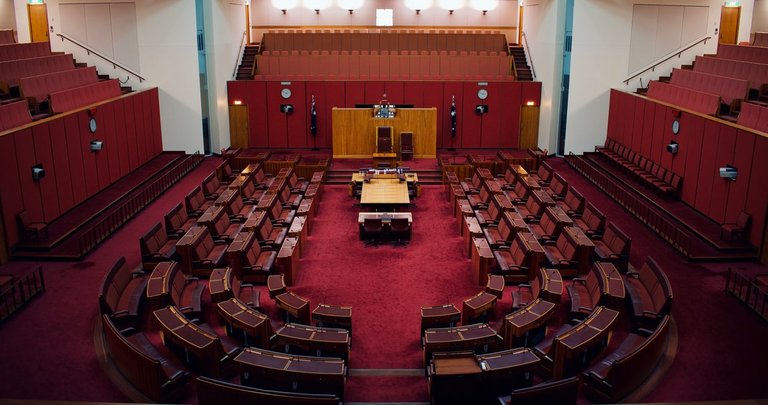Thinking about the Australian Electoral system....

For most of my voting life, I've been an in-principle proponent of the Australian electoral and governance system at the national Federation level. There are a couple of unique features of the system that I thought were vast improvements upon the democratic systems that other Western nations had, which emphasised our history of Commonwealth and a egalitarian outlook on wealth and distribution.
As a relative newcomer to the company of nationhood, we were able to implement things early on that now seem pretty obvious... like women's suffrage (universal suffrage had to wait a bit... that was a dark trade off....) and secret ballots to name a couple of democratic "innovations".

Two Features

The features that I really thought were uniquely good for the Australian democratic system were: Compulsory Voting and Preferential Voting. These are two distinct features were two concepts that tied harmoniously into other features to preserve our democratic system, like the Senate (State representation) and an independent Electoral Commission for determining boundaries and other election based problems.
Compulsory Voting
Unlike other countries, we view the act of voting to be a citizen's duty... now, I have heard before that it should not be in the purview of a government to compel you to vote. However, the technical part of this idea is that you are only compelled to show up once every election cycle and collect the ballot papers. After that, you can do whatever you want with them... eat them, draw pictures, build a paper boat or even cast a vote!
It is part of the social contract that binds us as a nation. We all take part in the process of choosing a government, and so there can be no sense of non-ownership of the result due to the lack of participation. Another benefit is that parties need to pitch to the centre of the electorate rather than going to the Left/Right to bring out a loyalist vote.
Preferential Voting
I have had friends describe this concept as an amazing and wonderful development on the system of casting a vote. Most countries have a version of first past the post, whereby the winner of a seat or district is just the guy with the most votes after all the votes are counted.... this is where the voter can choose only a single candidate for their vote.
Preferential voting requires the voter to number all (or a minimum quota, or to follow a preset party preference announced before the election) available candidates from first to last. In the first round, all the first choices are tallied and the candidates ranked in order. The LAST candidate is removed, and all of their supporting votes move to the second preference.... repeat and rinse until you have a clear winner (more than 50% of the available votes).
This system allows you to vote for minor or single interest parties without "wasting" your vote, as your preferences will still be followed if your preferred candidate gets eliminated from the race.

My Current Problems....

Since I got old... I started thinking more about these systems. Like any system, given the will, they can be gamed and their usefulness starts to grow stale. In theory, these systems are good and interesting ideas with worthwhile intents... however, in practice, we essentially get a two-party system in the Lower House, and in the Upper House we usually have a balance of power party (independents, or non-centre Left and Right) holdings sway.
Now, the Upper House was designed to be a balance against the excesses of the governing party in the Lower House... it was designed with equal representation among the States (and Territories) that make up our Commonwealth. So, Senators should be viewing governance and law-making with respect to the impact on their state constituency. In recent history, we have seen that it has turned into a party line affair...
Compulsory Voting
One assumption with Compulsory Voting is the idea that the population in general is informed and active about governance and the effects of law making and policies. Let us just say that that might have been a touch idealistic.... Most people don't follow the news in a broad way (listening only to a narrow cast of familiar ideas...)... and with little depth (slogans and easy to market narratives are much more memorable than a 500 page academic analysis). Or more depressingly, it becomes a matter of how much is received in "bribes" (sorry, tax relief or redistribution... depending on what affects your particular situation)... it is a weighing up of financial incentives rather than ideas that have little immediate monetary values (sigh, that is another post there...).
Another problem is the emergence of politics as a "team" sport.... by this, I mean that people will vote constantly for their "team"... as if it was a football match rather than a contest of ideas and policy platforms. Brand and team loyalty are paramount... I say this as a voter who leans progressive on certain issues and conservative on others... I wish I could have different votes for different agendas (that is a topic for a different post!).
Preferential Voting
In theory, this should have allowed us to vote for any candidate in our own preferred preference rather than trying to play the game of voting for the imperfect candidate so as to now "waste" your vote. However, in practice... most of the votes flow back to the two centre parties.
It could be worse I guess... but it does give the centre parties a sense of entitlement... the idea that they are either the current rulers... or the rulers in waiting.

Maybe it is the Senate?
In the end, I still think that the ideas of Compulsory and Preferential voting are much better than the alternatives which we see in other Western democratic nations. Perhaps the problem does lie in a different place... given that there are weaknesses in the concepts of Compulsory and Preferential voting as trade offs for their quite substantial advantages. Perhaps the solution to their weaknesses lies in a different part of the governance structure.
The Senate has started to reflect too much the Lower House... this is not a great thing, as to serve as a check and balance, it needs to have a different composition. Normally, the government of the day will have to negotiate the passage of most of the bills with the cross-benches (the balance of power parties)... but otherwise, the opposition and government will reprise their roles from the Lower House. Meanwhile, the balance of power parties are generally single issue or protest parties....
Perhaps the time has come to reform the Senate... into a proper representative chamber. Perhaps one chosen by a proportional voting system like Netherlands and Scotland? Where the number of seats is allocated by the proportion of votes won... this allows a greater sway to minor parties at the expense of the major ones.
Or perhaps some more radical... sortition.. a lottery, an addition moment of duty by every citizen. Citizens called to service for a set period of time to consider and debate laws and bills.... it has been shown that if people are asked to work together on a problem to find a solution, they will do it... in a manner that also softens and reconciles extreme views in favour of finding an equitable consensus.. most of the time, the extreme views are a position of reaction against an imagined opposition anyway (the famous internet straw man...).


Account banner by jimramones


According to the Bible, How should a Christian deal with peer pressure?
Comment what you understand of our Youtube Video to receive our full votes. We have 30,000 #SteemPower. It's our little way to Thank you, our beloved friend.
Check our Discord Chat
Join our Official Community: https://beta.steemit.com/trending/hive-182074
Do you still vote in the Aussie elections? My hubs doesn’t as he is no longer considered an Australian resident. And not being a citizen of the US he can’t vote here. He is a man without a country!
I wish he could get citizenship here.... especially for this upcoming election, but alas not enough time. 😪
No, I'm no longer considered a resident either for the electoral roll.... I can vote in the local elections here in Netherlands though... I'm not quite sure what sort of rights I have after I become a permanent resident though....
I prefer the Australian system to the Canadian system. Canada's senate is useless (appointed by government to rubber stamp).
We have first past the post and some regions have 1 MP per 30,000 people while olthers have 1mp per 150000 people. Hardly democratic.
Also mandatory voting is awesome. Both countries have quality education and free enough media. People are dumb and make poor choices everywhere. No worries in 4~5 years we can make more poor decisions.
I agree about the Senate. Completely. But... I do like the multi-party system Canada has. It leads to less deadlock than we see in the US.
The multi-party system is great, minority governments are my favorite type. Compromise is very important on most issues.
Okay... that is pretty terrible if the second house of parliament is appointed by the governing party! The strange representation quotas is also a bit funny... I would have thought that they needed to do it by representative population... even if they have to gerrymander the whole thing...
The senate is a complete mess.
As for ridings, they try to limit it to something like 125000 (I'm not sure exactly). However, it's by the census and some areas in the suburbs near big cities grow so rapidly, 5 years or however often the census is can be a lot, especially depending on when the election is as well.
In some of the small unpopulated areas, it is because of old deals where they cannot lose ridings (East Coast Mostly). In others, it is the very underpopulated and large northern regions. Actually when looking at a national map of the colours won, sometimes it is completely misleading because there are some ridings that are 500000~ 1 million square kilometres (the three territories and the northern ridings of the larger provinces. Then there are the ones in the city that are like 20 square kilometres if that.
You can find the community announcement on Discord :) and it has also been shared on our FB Page and Twitter feed.
This post was curated by @theluvbug
and has received an upvote and a resteem to hopefully generate some ❤ extra love ❤ for your post!
JOIN ME ON TWITTER
In Proud Collaboration with The Power House Creatives
and their founder @jaynie
JOIN US HERE
FOLLOW US ON TWITTER
In our country it is a right to vote but not mandatory. I think I like the mandatory thing in voting. Shows the true voice of the people but sad to say. In a lot of previous elections voting, is tampered in favor of those who has the money. Hoping future elections will truly speak the truth as changes has begun already.
Mandatory voting is really quite a good thing... there are downsides... but at least it engages the population as a whole.... however, even in this system... money still helps a lot... most people don't really pay attention until a month or week before the election... and they don't bother to research the party platforms... instead relying on advertisements...
I can only speak about the US Democratic Republic, but I think at this moment in time we are faced with a worldwide assault on "our" type of governments.
When you write, "but it does give the centre parties a sense of entitlement... the idea that they are either the current rulers... or the rulers in waiting," THIS is a big problem. They aren't our rulers - they work for US! We the people say what goes, not them!
Through their actions, they are now telling us that without a doubt, they will tell US what to do, how to live, and what we can say and do. This power grab must be defeated, and only the people can see to it.
How strong are the people? That's the question. How much will we put up with?
Something that I find weird about the US system is the fact that the country rebelled against dynasties and such things... only to find themselves with a dynastic political class...
... that said, as terrible as we think things are... things can get worse! We might find that we broke something that wasn't as bad as the thing that replaces it...
Congrats! on your upvotes from the IBT Community
Aw man, I could go on for a long time about various democratic systems as well. I grew up with the Canadian system and now live with the American system and, like you, I will say that every system has it's strengths and weaknesses. Ultimately, however, every system requires the attendance of the electorate to participate in an educated manner.
I've had an idea that would require anyone who wishes to vote to take a civics exam every X number of years. Nothing too difficult, but perhaps similar to an exam a new Citizen would need to take. In the US, at least, if you don't know how many States are in the Union, in my opinion, you should definitely not be allowed to vote.
Yes... something like a civics exam would be a really good thing... however, I guess that does disadvantage some people who might not have the time to actually attend the exam (yes, I know it could be done over the internet... but even then... people procrastinate if they don't find it important...).
Interestingly enough... often it is new migrants who will know more about a country than the people who had to grow up there... mostly due to the civics knowledge requirement of becoming a citizen.
I'm not allowed to talk politics, but, everyone here brings up some very interesting points.
Great write, Bengy.
!tip .20
Thanks... although, technically... this isn't politics! It is more of a structural thing... no partisanship here!
🎁 Hi @bengy! You have received 0.2 STEEM tip from @dswigle!
@dswigle wrote lately about: Trees Tuesday On Your Wednesday Walk Feel free to follow @dswigle if you like it :)
Sending tips with @tipU - how to guide.
I understand. Sometimes it can be intimidated. I think they make it that way to confuse people. You try to do the right things, but then all the different rules you have to follow in order to do the right thing.
Heh... yes... but in general, the rules for the elections are pretty straightforward... although, I do question if the structures are doing what they were designed to do.. or if they are now ripe for gaming the system.
All that I can say here is that money talks.
Oh yea, and I hope that the wild fires are sorted out soon.
Blessings!
Yes... money always talks... but there are ways to hopefully dilute that effect. Sortition would help with that... after all, if you don't know who to bribe... it gets quite difficult to cover all the bases!
True here my friend. There is always hope.
Blessings!
I find the idea of preferential voting a rather profound idea.
It is a great idea in theory... however, in a two party dominant system... it does tend to produce an outcome which favours one of the dominant parties.
Of course. And the only thing worse than a two-party system is a one-party system. ;-)
Haha... yes, definitely true!
Interesting...
In lak'ech, JaiChai
Thanks... it is idle thinking! Trying to get my thoughts into a coherent sort of form!